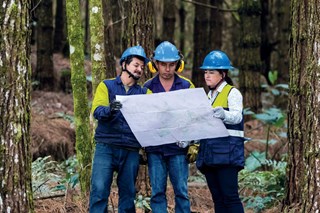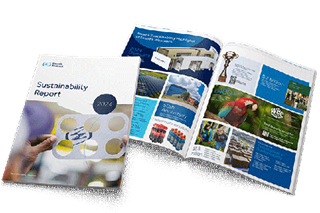Sharing Biodiversity Knowledge
Identifying species in our forests sets a baseline for a collaboration with local organisations on nature protection and improving the ways how we work individually and together
“Long before sustainability was even a topic for discussion, we decided to contribute to the environment through a focus on conservation and sharing our in-depth-knowledge,” says Adriana Marin, Planning Process Engineer who is in charge of Forestry FSC certification. Since 2005 Smurfit Kappa Colombia Forestry Operations has worked to protect and understand biodiversity and ecosystems. It makes sense, because sustainable forest management ensures continuity of the business and to manage forests sustainably, we need to conserve their diversity. Adriana is responsible for the young tree generation in our commercial plantations, but she has a specific interest in our research on Podocarpus family of pines, the only national pines species in Colombia. This helps the nurseries to produce healthy trees for our plantations and the research would not be possible without our forest conservation programme.
One third of the land Smurfit Kappa owns and manages in Colombia is dedicated to conservation. We work together with local universities to understand the diversity of our flora and fauna and so far, some 3,000 species have been found in our natural and rehabilitated forests. 52 of them are threatened. One of the endangered species thriving in the Smurfit Kappa forests is the Andean Bear that was already believed to have disappeared completely from the region. “In 2022, we started the second round of inventories,” says Nicolas Pombo, Director of the Forest Division, “the first inventory set the baseline and next we will be able to measure growth in diversity and see if our forest conservation efforts have paid off.”
The Forest Health Programme at Smurfit Kappa is led by entomology specialist, Divanery Bolaños, and forestry pathology specialist, Ginna Zabala. Their team studies and publishes scientific research and applies integrated pest management with emphasis on biological control in our forest plantations. The company has committed to integrated pest management and to keep the plantations and forests healthy, understanding the equilibrium in the nature is the best way. The Programme uses natural enemies of the pests, such as friendly insects that eat harmful insects, in our forests to protect them – in other words, it harnesses biodiversity for commercial use. “We want to ensure that we are not polluting our environment, our waters when managing forests,” Carlos says and continues “therefore it is our responsibility to work with the nature and share our knowledge.”
Smurfit Kappa's aim is to contribute to sustainable forestry, supporting the concept of circularity in forest management. Learn more about our forestry commitments.



















